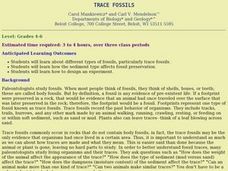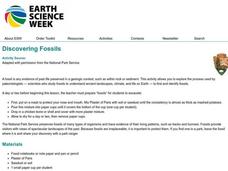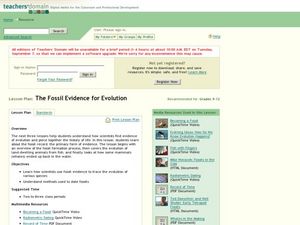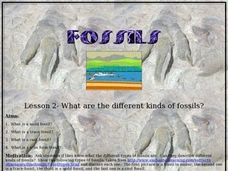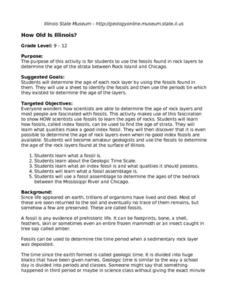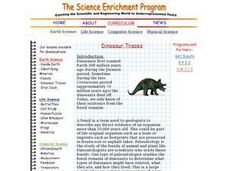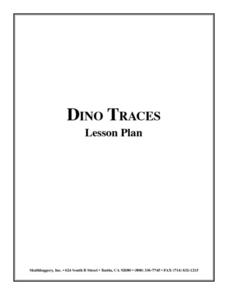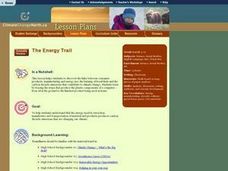Curated OER
Science: Making Trace Fossils
Young scholars explore types of fossils and discover how sediment affects fossil preservation. They focus their study on trace fossils and create their own using sediment, water, and a small organism such as a snail or lizard. Students...
Curated OER
Discovering Fossils
Students explore fossils. In this fossils geology lesson, students use tools to reveal embedded "fossils" (made with plaster of Paris by the teacher-instructions included), then describe and illustrate their findings.
Curated OER
Fossils!
Students explore what fossils are, how they are formed, what different types there are and why they are significant to both our present and past geology history. They participate in a hands on fossil observation of their choice and...
Curated OER
Fossil Kit II
Youngsters examine four fossil replicas and chart their time periods, vertebrate or invertebrate, and the names of other organisms living at the same time. A specific fossil kit is available for sale if you do not have the same samples....
Curated OER
The Fossil Evidence for Evolution
High schoolers examine how scientists use fossil evidence to trace evolution of various species and methods used to date fossils.
Curated OER
What are the Different Kinds of Fossils?
Students examine different types of fossils. In this fossil activity, students investigate the attributes of mold fossils, trace fossils, cast fossils, and true form fossils. Students create their own fossil samples.
Curated OER
How Old Is Illinois?
High schoolers use fossils found in rocks to determine the age of the strata between Rock Island and Chicago. Pupils pretend they are geologists. They must determine the age of all rock layers between the Mississippi River and Lake...
Curated OER
Fossil Formation Fun
Students compare the three types of fossils: preserved organisms, mineral replacement fossils, and impression fossils. They create a model of amber,
sponge fossil, and make traces of fossil.
Curated OER
Examining the Fossil Record
Students create an evolutionary tree based on fossil morphology and their ages. In this fossil record lesson plan, students are given 23 pictures of fossil. They study their morphology and arrange the fossils by age and structures on a...
Curated OER
What Do We Learn From Fossils?
Students investigate what a fossil is and how it came to be. In this fossil lesson, students examine pictures of skeletons and identify characteristics that can and cannot be determined by a fossil. Students complete diagrams...
Curated OER
How Old Is Illinois?
Students use fossils found in rocks to determine the age of rock in Illinois. They use a chart to identify the fossils and then identify the periods of rock.
Curated OER
Dinosaur Traces
Learners identify and interpret the type of evidence found at a typical dinosaur dig and mimic a paleontologist by taking crayon rubbings of simulated bone impressions. After the rubbings are taken, the students reconstruct the complete...
Curated OER
Science: Fossil of a Carbonized Plant
Students classify leaves by shape and margins and use them to create models of plant fossils. By using paper over a leaf, they simulate fossilization of organisms onto sedimentary rocks. Following instructions on worksheets, students...
Curated OER
When Dinosaurs Ruled The World
Young scholars discover how a paleontologist digs up fossils and what tools they use. In this paleontology lesson, students discuss the importance of the job of a paleontologist, watch a video on the process of extracting fossils,...
Curated OER
Make a Cast of a Tyrannosaurus rex Fossil
Second graders examine the formation of fossils and list the different types. They make cast model of a dinosaur fossil. They write about conditions that are necessary for fossils to form and create a model of a buried fossil.
Curated OER
Dino Fossils
Primary paleontologists discover the information they can gather from examining fossils. They place pictures in the correct sequence showing how an animal becomes a fossil. They discuss which sediments would preserve fossils better as well.
Curated OER
Studying Fossils
Learners study the Evolution in the Light of Fossils. Activities in this lesson range from quantitative measurements of hominoid skulls to the comparison of hominoid bone structures. They hypothesize dinosaur size and speed by looking at...
Curated OER
Science: Down Home Dinosaurs
students participate in hands-on activities to discover the different types of fossils. Using teacher-provided materials, they make models of cast and trace fossils. After writing essays describing how traces are formed, students plan a...
Curated OER
Dino Traces
Students are introduced to the type of evidence that is found at a typical dinosaur dig. They create rubbing casts of bone impressions on paper and, using bones, identify dinosaurs.
Curated OER
The Energy Trail
Learners examine the relationship between the products they use and energy use. Using the internet, they identify the role that manufacturing plays in using energy and the emissions that change the climate. They discover the steps to...
Curated OER
Candy Bar Subsurface Geology
Students are introduced to drawing and interpreting topographical maps. They each cut through there Jell-o mountain at regular height intervals, and trace around the shape of the Jell-o cut off at the height, overlaying the different...
Curated OER
The Moving Continents from Pangaea to the Future
Eighth graders examine how the movements of the Earth contribute to fossil distribution. In this fossils lesson students make maps of the placement of the continents.
Curated OER
Rocks, Minerals, and Erosion
Students identify and describe rocks that contain records of the earth's history and explain how they were formed. They formulate questions about and identify needs and problems related to objects and events in the environment, and...
California Academy of Science
Human Evolution
As the great and hilarious Tim Minchin once said, "Science is simply the word we use to describe a method of organizing our curiosity." Science is more than just a guess; it is based on questions, observations, and evidence. High...
